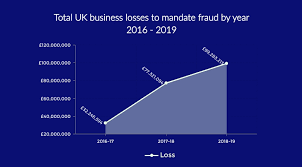Mandate Scam
Mandate scams involve fraudsters using a company's name and logo to pretend to be a legitimate business. They will contact potential victims, claiming to have a mandate to collect a debt or deliver goods and services in exchange for payment. The fraudster will then ask the victim to provide banking details to make the payment, which they use to transfer money from the victim's account. In some cases, the fraudster may also ask the victim to pay an upfront fee, which they will not receive anything in return for.

Risks in Mandate Scams :
Mandate scams involve criminals impersonating companies or individuals in order to gain access to sensitive information or financial assets. These scams are especially dangerous because the impersonator may be able to gain access to business accounts, personal accounts, or other confidential information.
The risks of mandate scams include:
Financial Loss:
The most obvious risk of mandate scams is financial loss. Criminals may be able to access bank accounts and transfer funds to themselves or to other accounts. In some cases, the scammer may be able to gain access to credit cards or debit cards and use them to make unauthorized purchases.Identity Theft:
Mandate scams can also lead to identity theft. If a criminal gains access to a person's banking information, they may be able to use it to open new accounts or take out loans in the person's name.Phishing:
Criminals may also use a mandate scam to send out phishing emails. These emails are designed to look like they're from a legitimate company, but they're actually designed to steal personal information.Damage to Reputation:
Mandate scams can also damage a person or business's reputation. If the scammer has gained

How to protect from Mandate Scams
Mandate scams are fraudulent activities where criminals pose as legitimate businesses and attempt to steal money from unsuspecting victims. To help protect yourself from mandate scams, consider the following tips:
Do your research: Always research any company requesting money or personal information before providing it. Look up the company's website and contact information, and use it to verify the legitimacy of the request.
Watch out for red flags: Be wary of requests that use high-pressure tactics or sound too good to be true. Also, be suspicious of requests for payment via wire transfer or pre-paid debit cards.
Never send money: Never send money to someone you don't know and trust. If you are asked to pay via wire transfer, it is most likely a scam.
Consult a professional: If you receive a suspicious request for payment, contact a legal or financial advisor to verify its legitimacy.
-
Report any suspicious activity: If you suspect that you may be a target of a mandate scam, report it to the appropriate authorities.

How to spot a Mandate scams :
Be wary of unsolicited requests. If you receive an unsolicited email or letter from someone claiming to be from a government agency or an official third-party representative, be wary. Legitimate government agencies and officials would never solicit money from you in an unsolicited manner.
Watch out for requests for payment from third-party representatives. Legitimate government agencies will never require you to pay a third-party representative to process your paperwork or to receive funds.
Do not pay upfront fees. If someone asks you to pay an upfront fee for a grant or to process paperwork, this is a scam.
Verify the legitimacy of the request. If you are suspicious of the request, contact the government agency to verify it.
Research the company or individual. Research the company or individual making the request online, and search for any complaints or warnings.
Never provide personal or financial information. Do not provide personal or financial information, such as your Social Security number, bank account information, or credit card information, to anyone you do not know and trust.

How to stop the Mandate Scams :
Never respond to phone calls, emails, or text messages that request personal information. Legitimate companies will never ask for sensitive information in this manner.
Verify the identity of the caller by asking for their name, company name, and contact information. Call the company back at a number you know to be legitimate to confirm their identity.
Do not provide any payment information until you have verified that the company is legitimate.
If you feel pressured to provide information or make a payment, hang up the phone.
Report any suspicious calls, emails, or text messages to your local law enforcement agency.
